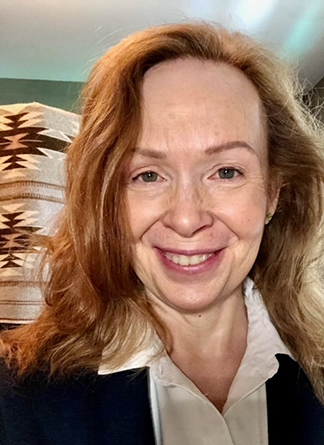Mary C. Fuller New Chair of the Faculty
Professor Mary C. Fuller will succeed Lily Tsai as Chair of the Faculty on July 1, 2023, after serving as Chair-elect during the current academic year. Mary is Professor of Literature and a MacVicar Faculty Fellow; she served as Associate Chair of the Faculty in 2011-13, and as Head of Literature 2013-19. Professors Annette Hosoi (Mechanical Engineering) and Elly Nedivi (Brain and Cognitive Science) will serve jointly as Associate Chairs of the Faculty.

Mary was born in Atlanta, to a family with deep roots in the South. Early on, her parents emigrated to Québec so that her father could teach chemical engineering at McGill. She had the good luck to attend public schools that were running what was then a pilot experiment in bilingual education for Anglophone students. She returned to the U.S. to attend Dartmouth College in the early years of coeducation, received a PhD in English and American Literature from Johns Hopkins, and joined the Literature faculty in 1990 after a year as visiting lecturer.
Her academic career began in a fairly traditional way with the study of early modern English drama. In a graduate seminar conducted by her advisor Stephen Orgel, a famous editor of Shakespeare’s plays, she and her colleagues encountered among the sources for Shakespeare’s Tempest the “Bermuda pamphlets,” narratives of a storm and shipwreck that waylaid an early expedition to the English colony at Jamestown. Before departing Hopkins for a job at Stanford, her advisor suggested that she should consider focusing on these sources in maritime history.
His advice opened the door to a deeply interdisciplinary research area. Many sources like the Bermuda pamphlets survive, some in manuscript, some in print, and some accumulated into collections that have had an outsized role as both historical sources and (in effect) arguments about the past. Early modern voyagers used writing to manage and record a complex encounter with the world, and the documents they produced served and continue to serve a surprising variety of purposes.
Mary’s first two books focused on early English writing about North America and the Atlantic world, and on how collective understandings of that past have been shaped out of the stories told by early modern sources as these have been selectively remembered and forgotten.
Her forthcoming book, Lines Drawn Across the Globe (2023) has a broader focus, studying a multi-volume collection of hundreds of travel narratives, royal letters, ships’ logs, maps, price lists, and commentaries printed in 1600 to document the global reach of English merchants and mariners. Assembled by an English minister who knew many of his voyager/ authors, this vast work covers regions from the Arctic to the Straits of Magellan, from Sierra Leone, Russia, Morocco, Iceland, the Ottoman Empire, Mongolia, the Caribbean, and Persia. Its contents call on disciplinary knowledge from archaeology, botany, cartography, ethnography, geography, the history of information, library studies, mining and metallurgy, naval history, religious history, sociology, and numerous national and regional histories. Building the intellectual networks that made her own book possible was one of the fascinating aspects of the project. Being responsible to its subjects called for long and deep reflection.
At MIT, Mary teaches poetry. Her introductory classes look at modern and contemporary American poetry; she’s interested in how to approach poems from a naïve perspective, and in teaching students how to ask questions that are both answerable and have answers that accumulate into insight. As a specialist in the early modern period, she also teaches the works of Dante, John Milton, and Edmund Spenser in more advanced classes, aiming to make students confident readers of these influential and complex works and to use them (as the authors might have wished) to engage with fundamental debates about choice, freedom, power, and the way to live.
At MIT, Mary has served on the Nominations Committee, the Committee on the Undergraduate Program, the Committee on the Graduate Program, SOCR, the Faculty Policy Committee, and the Corporation Joint Advisory Committee, on numerous other advisory and steering committees at the Institute. In addition to the MacVicar Fellowship, she has received the SHASS Levitan Prize, the Levitan Teaching Award, and the Outstanding Veteran Advisor award for first-year advising. She has held research fellowships at the Folger, Newberry, John Carter Brown, and Huntington Libraries, and received funding from the National Endowment for the Humanities.
Soon after joining the faculty, Mary also began studying the Japanese martial art of aikido. She was fortunate in meeting Mitsunari Kanai Sensei, who had been an apprentice of aikido’s founding master, and for many years took the Red Line to Kanai Sensei’s dojo in Porter Square for training five or six days a week. She began teaching classes at area dojos in the late ’90s, as well as travelling nationally and internationally for seminars with different teachers. Like any art or physical discipline practiced seriously, aikido provided hours of sustained focus that were a great respite from the demands of academic life; as a martial art devoted to harmonizing conflict, aikido also has offered useful lessons on the joys of working with people who are willing to come at you. She continues to study as her schedule permits, and holds the rank of godan (fifth degree black belt).


